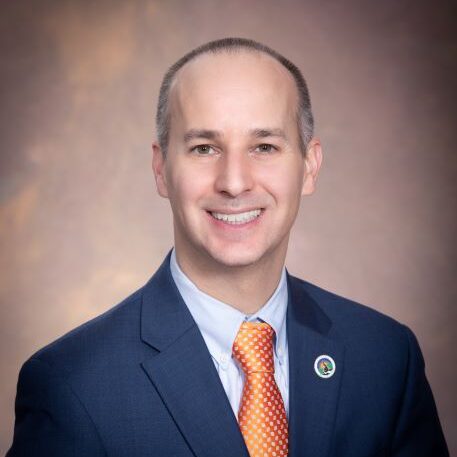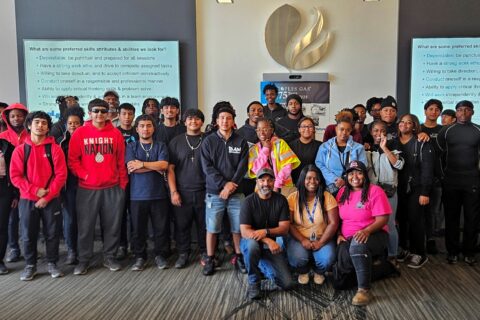The college application process evokes thoughts of completing FAFSA, the Common App, drafting essays or personal statements, researching scholarship opportunities, and trying to decipher the cost of tuition and housing. For some, taking standardized tests like the ACT and SAT is the moment when they first begin to think of their postsecondary education. In Lansing, we start thinking about postsecondary education at kindergarten enrollment. That’s the moment when a child savings account (CSA), earmarked for postsecondary education, is automatically opened, and seeded with $5, for all students in the Lansing School District.
Lansing SAVE, Michigan’s first CSA, launched in 2015 as a partnership of Michigan State University Federal Credit Union, Lansing School District, and the City of Lansing. We launched this program based on the research of Dr. William Elliot, a University of Michigan professor. In 2013, Dr. Elliot published an article that found that a child from a low to moderate income household with school savings of $1 to $499 before college age is more than three times more likely to enroll in college than a child from a low to moderate income household with no savings account and more than four and half times more likely to graduate. Essentially, a student who knows they have a savings account specifically meant for postsecondary education is more likely to enroll in and graduate from a degree or certificate program. Lansing’s program design also drew heavily from the research of Dr. Daphna Oyserman regarding what she termed “identity-based motivation.” To sum it up in layman’s terms, when we begin referring to children as future post-secondary students when they are five years old, they are much more likely to imagine themselves in that role by the time graduation draws near.
By opening their CSA upon kindergarten enrollment and supplementing it with grade-appropriate financial education lessons, there is a significant effort to establish a college-going mentality at an early age. Lansing SAVE supports students through their academic years in the Lansing School District and begins to have a compounding effect in middle school, at which point other postsecondary support programs begin to kick in. The Promise Pledge is a ceremony for 6th graders, with 5th graders watching in the audience. At the Pledge ceremony students commit to reside and finish high school within the Lansing School District boundaries.
Throughout the K-12 learning experience, the Lansing School District has created a unique learning environment for its students with The Lansing Pathway Promise, an opportunity-ready system aligned to three high-need career areas. In each Lansing high school, the Capital Area College Access Network provides a College Advisor – a highly trained AmeriCorps member who assists students with planning, FAFSA completion, applications, and scholarships. Lansing students then apply for Lansing Promise, a last-dollar scholarship program, within two years of high school graduation. Promise Scholars receive up to 65 credits at Lansing Community College (a value of $7,410), plus assistance with books and course fees. At Davenport University, Michigan State University, and Olivet College, the Scholarship provides $2,500 per semester for the first four semesters, a total award of $10,000.
Once the student reaches the age of 18, they are eligible for free, professional, one-on-one financial counseling at the Financial Empowerment Center (FEC), a program of Cristo Rey Community Center that is funded by the City’s Office of Financial Empowerment – and can continue to tap into that resource throughout their adult lives. The counseling helps them budget, access community resources, pay down debt, increase savings, and improve their credit scores.
Lansing was, however, “programs rich but systems poor.” The education and personal finance support programs in Lansing were aware of one another, in fact, meeting monthly to align their work, but wanted the families to feel their work as one system – one that takes their hand at kindergarten enrollment and holds it until retirement through intentional connection and warm hand-offs. This vision became a formalized partnership in 2019 as BOLD Lansing. BOLD Lansing is a continuum of supports that empowers Lansing students and families to pursue their educational and financial goals, including free one-on-one financial counseling beginning at age 18. Each of the BOLD Lansing partners has an area of strong, evidence-based expertise. By relying on this, no partner must try to deliver services that are not in its wheelhouse. No entity in our region is better at assisting with FAFSA completion than CapCAN, and so all partners refer families to that agency. No financial education workshop will assist families the way one-on-one financial counseling through the FEC will, and so all partners will refer families to that service.

With the initial cohort of Lansing SAVE students entering 8th grade this fall, we are about to see the compounding effect of integrating programs through all grades in the Lansing School District. Looking ahead, Lansing can serve as a model to other municipalities seeking to build out a similar network of support. However, our work does not end here. We continue to explore methods for increasing student account balances, such as expanding the Community Champions model. The invention of a Lansing church, this model allows faith-based institutions to select a geographic boundary around their physical location, and we in turn let them know how many Lansing SAVE students are within those borders. Every month with a fifth Sunday, the Champion churches take up a special collection and deposit it at the credit union, where it is divided evenly into the accounts in that area. Lansing SAVE students with a Champion have a balance that is more than 3X the balance of those without a Champion – so the BOLD team is determined to make sure every student has as least one Champion. The existence of the CSA already has a significant impact on the likelihood that a student will enroll and graduate from a postsecondary program. The next step is ensuring the CSA account balances are built up enough to lessen the financial burden of pursuing additional education after high school.
If you’ve had the pleasure of visiting us in Lansing, you’ve likely heard me say that “Lansing’s time is now!” It’s time to partner, time to collaborate, time to be efficient and effective in how we continue developing the infrastructure that will support our students, and our community, for generations to come.

About the Author:
Andy Schor, Mayor of Lansing Michigan.









